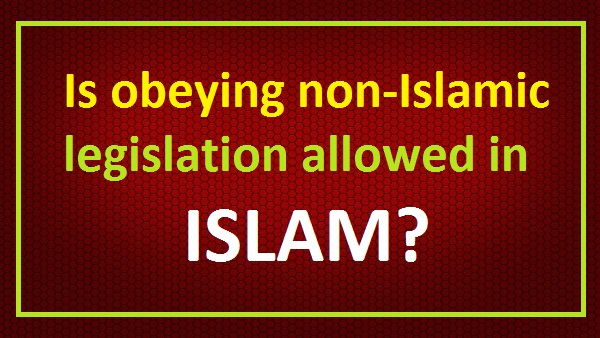
Allah says, in Surah ul-Qitaal (the Chapter of Fighting):
“Verily, those who became apostates after the guidance has been
manifested to them, Shaytaan (Satan) beautified for them (their apostasy
and false hopes), and (Allah) prolonged their term (age). That is
because they said to those (Disbelievers) who hate what Allah has sent
down: ‘We will obey you in some of the matters,’ but Allah knows their
secrets.” [47:25–26]
Explaining the first part of this verse (“Those who became apostates…”), Ibn Katheer said:
“…Those who abandoned Imaan and went back to kuffr (disbelief).” [At-Tafseer, volume 4, page 193]
It has been narrated in the aforementioned verse that a number of
Believers became apostates after announcing they would obey the
Disbelievers in some matters only – not all. If this is the case when
one obeys the Disbelievers in only some issues, what is the situation of
those who declare absolute obedience to them and say that we must obey
(all) their laws?!?
A group of idolaters approached the Prophet
(saws) and his Companions, debating the issue of un-slaughtered meat.
They said to the Believers, “You claim that you seek Allah’s Pleasure,
yet how is it that you do not eat what Allah causes to die, but you eat
what you slaughter (kill) with your knives?” Allah then revealed
the verse:
“…And certainly, the Shayaateen (devils) do inspire
their friends (from mankind) to dispute with you, and if you obey them
(by making the meat of dead animals halaal), then you would indeed be
Mushrikoon (polytheists, i.e. Disbelievers).” [6:121]
So Allah issued a stern warning to the Believers, informing them that if
they obey the Disbelievers by permitting what Allah has forbidden – in
this case, the meat of dead (un-slaughtered) animals – then they would
undoubtedly become Mushrikoon (people who worship many gods).
The Types of Obedience
Obedience is two types: (1) praised and (2) dispraised.
The dispraised form of obedience is, as well, two types:
- Apostasy
- Sin (which does not expel one from Islam)
- Sin (which does not expel one from Islam)
Obedience that constitutes apostasy
If a person looks to a creation (i.e. human) and merely believes they
have the right to be obeyed for who they are, that person will become a
Mushrik (polytheist) – even if they have not yet obeyed them. And if
they are obliged by an authority to do something which contradicts the
Shari’ah, such as being asked to join their police, army, security
services, intelligence and so on, it is Kuffr Akbar (major apostasy) if
they answer (obey) that call.
As a further example, if a
Muslimah does not wear the khimaar (headscarf) outdoors
(in public), she is undoubtedly committing a sin. However, if the same
woman chooses not to wear it because the law (authority) has made it
prohibited (illegal), she will become an apostate as she is obeying
legislation that opposes the Shari’ah.
Allah says in the Qur’aan:
“The rule (power of legislating) is for none but Allah.” [12:40]
Imaam al-Baghawi commented on this verse, saying:
“Indeed the (right of) ruling, commanding and prohibiting is for none but Allah.” [Tafseer ul-Baghawi, volume 2, page 427]
So it is one of Allah’s main qualities, as Lord, to determine what is Haraam and Halaal, legal and illegal. And any person who believes this
characteristic (attribute) can be shared or given to anyone else –
whether prime minister, president, scholar, sheikh, or any man or woman –
is a Mushrik (Disbeliever). This is indeed the very meaning of Shirk –
to give an attribute (quality) of Allah to a creation.
The action of legislating (which is Kufr Akbar) manifests itself in the following ways:
- Istihlaal ul-Haraam – Legalising what is forbidden
- Tahreem ul-Halaal – Prohibiting what is legal
- Tahreem ul-Halaal – Prohibiting what is legal
- Juhood ul-Wujoob – Denying obligations
Allah says:
“… And He (Allah) makes none to share in His Decision and His Rule.” [18:26]
Imaam Abu Ja’far Muhammad bin Jareer at-Tabari (d. 311 AH) explained this verse, saying:
“Allah will never let His creation be a partner in His ruling and
judgement. He is indeed the only One who rules (legislates) and judges,
and He manages them (the creations) in whatever way He wills.” [Tafseer
ut-Tabari, volume 8, page 212]
In essence, the meaning of this
verse is that Allah does not share His attribute of legislating with
anyone. Therefore, only He has the right to make laws, and believing
otherwise will render a person Mushrik.
By our honored Ustadh Abu Waleed (hafidhUllah)
No comments:
Post a Comment